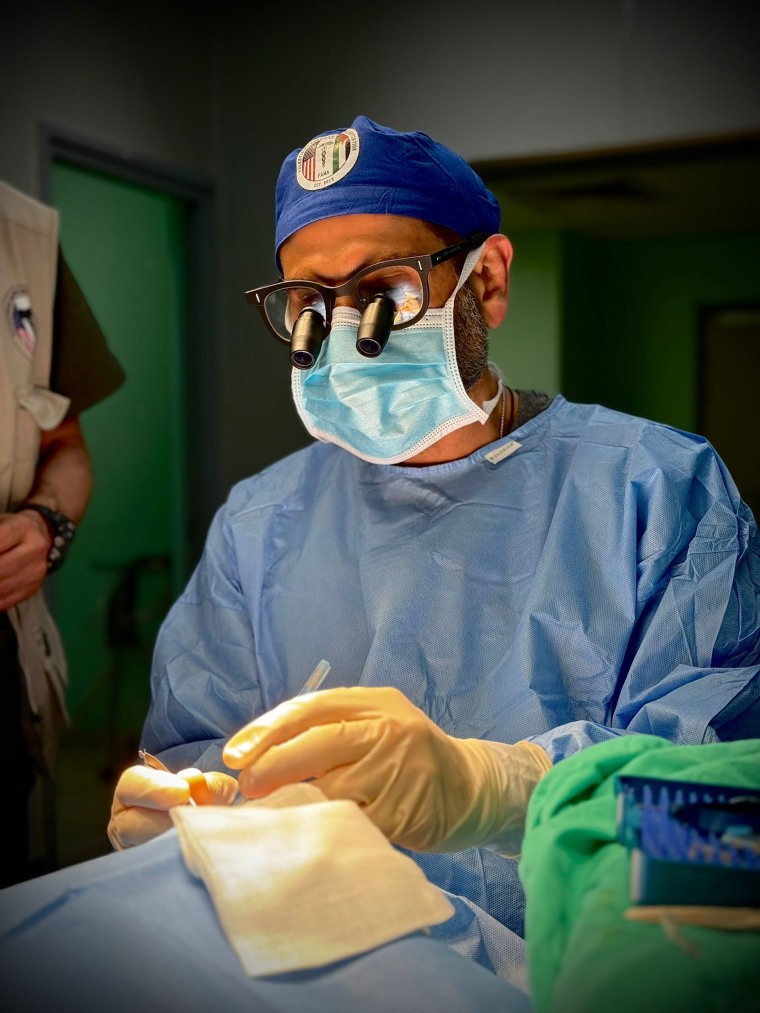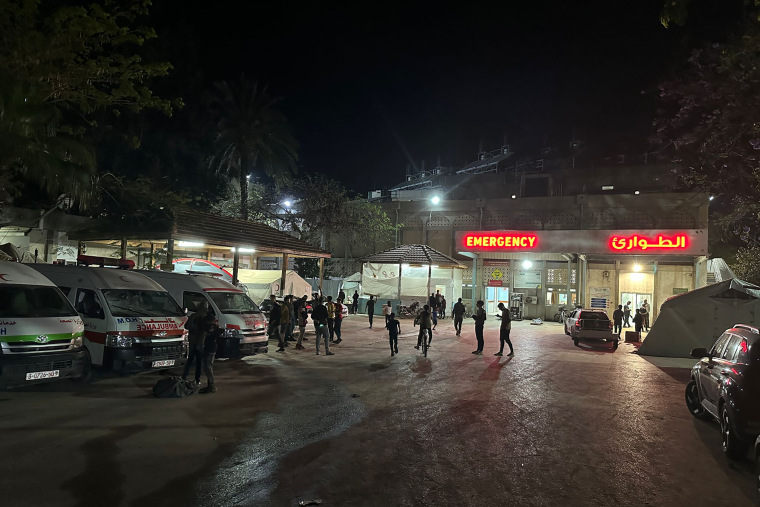The American doctor who helped save Sen. Tammy Duckworth’s life 20 years ago said from Gaza that his life and the lives of other doctors are at risk if they try to leave the compound where they are trapped.
“We cannot leave. If we leave, it’s basically we were told it’s at our own risk,” Dr. Adam Hamawy, who is in the southern Gaza city of Rafah, said by video call. “So if we leave the compound of the hospital, then we become legitimate targets.”
Hamawy said he could hear nighttime airstrikes around the hospital in Gaza while he was speaking to NBC News. After the strikes, it’s a wait to see how many casualties arrive.

“We are tired, but we’re still working during the day. We’re doing the best we can with the resources that we have to continue the mission that we’re here for — is to take care of the people in Gaza and the injured and the sick,” Hamawy said.
“We’re hoping to be able to go home and be relieved by another team soon,” he said.
Hamawy, from Princeton, New Jersey, is one of 10 American doctors on a team of 19 health care professionals from the Palestinian American Medical Association who traveled to Gaza this month to provide assistance at the European Hospital in the Khan Younis area of Gaza.
On Monday, they were blocked from leaving because the border crossing from Rafah to Egypt was closed.
The Israeli military seized the Gaza side of the Rafah border May 7 as it prepares what Prime Minister Benjamin Netanyahu has vowed would be an offensive in the city to attack Hamas.
“The intense part of the fighting, the smashing of battalions, is just weeks away,” Netanyahu said in an interview with CNBC.
The U.S. opposes a large-scale military operation in Rafah, citing a humanitarian crisis.
The United Nations high commissioner for human rights, Volker Türk, said this week that around 1 million desperate Gazans have no safe place to evacuate to and that “a full-scale offensive on Rafah cannot take place.”
More than 35,000 people in Gaza are dead, according to the Health Ministry in Hamas-ruled Gaza, in the war, which began after Hamas carried out terrorist attacks against Israel that killed more than 1,200.

In the sense that Hamawy and other doctors cannot leave without becoming targets in the war, “yes, we are trapped,” he said.
“What helps in that sense is we’ve got something to do,” Hamawy said, including operating on and caring for people. “We’re all happy that we have that ability to do something, and we’re not, you know, just looking out the window and hoping for the best.”
Duckworth, D-Ill., says Hamawy provided critical surgical care and saved her life after she was seriously wounded when her helicopter was shot down in Iraq in 2004. Duckworth, a Black Hawk helicopter pilot for the Illinois Army National Guard, lost both legs.
Duckworth said she and others have been “shaking every tree, calling everyone to make sure we do everything we can to ensure safe passage of these doctors to whatever crossing we can get them to.”
Hamawy said they have no idea when they’ll be able to leave, either.
Life for the average person in Gaza “is utterly horrible,” he said. He cited a nurse who went into work on the verge of collapse.
Hamawy said that the nurse had taken his wife and two children from Rafah to a “safe area” — a desert area with no shelter, no food and no electricity, where they waited eight hours for a jug of water that was not intended to be used for drinking, but that they had no choice but to drink it anyway.
“This is what it’s been like for the last seven days,” he said.
Hamawy is grateful that the choice has not come down to leaving Gaza without replacements to provide essential care.
“Hopefully that doesn’t come down as the offer,” he said. “Our ask has always been that we want to be allowed to leave freely and we want other aid workers to come in freely.”
For now, they wait and work with the resources they have under challenging conditions.
“Everyone keeps asking, like, do we know when we’re going to go, do we have any news, do we have any idea — and we have honestly no idea at all,” Hamawy said.
“It could be tomorrow; it could be two weeks from now,” he said.
